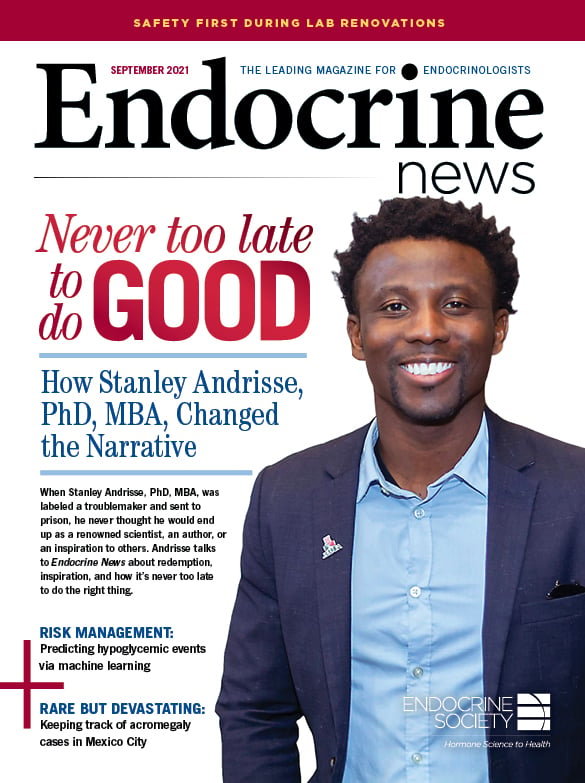
The September issue’s cover story should be an inspiration for all of us. In “Never Too Late to Do Good,” senior editor Derek Bagley talks with Stanley Andrisse, PhD, MBA, who details his life story that saw him move from a prison cell in Missouri to researching fat cells as an assistant professor at Howard University College of Medicine in Washington D.C. Andrisse details how he turned his life around while serving time after having been labeled a hopeless career criminal as a troubled youth.
Andrisse speaks very frankly to Endocrine News about his very different path to science, which, no doubt, is unlike any other scientist or academic in endocrinology and biomedicine. “I am a formerly incarcerated person with three felony convictions, sentenced to 10 years in prison as a prior and persistent career criminal. I was once told by a prosecuting attorney that I had NO hope for change,” he says via Zoom from London. “I am now Dr. Stanley Andrisse, endocrinologist, scientist, and professor at Howard University College of Medicine, former faculty at Johns Hopkins Medicine, affiliate at Georgetown Medical Center and my newest title, visiting research at Imperial College of London. I’d say that I may have changed just a little bit!”
Writer Eric Seaborg delves into the world of artificial intelligence in his article, “Risk Management: How Machine Learning Predicts Hypoglycemic Events in Hospitalized Patients.” Based on a recent JAMA Network Open paper, this piece details how a new software model has been shown to provide a rolling prediction about the next 24 hours after each blood glucose measurement is taken in hospitalized patients with diabetes. The model integrated dozens of clinical predictors via links to electronic hospital records through machine learning, which is essentially the same technology Netflix uses when it recommends Goodfellas after you’ve watched The Godfather. The lead author of the paper, Nestoras Mathioudakis, MD, MHS, clinical director of endocrinology, diabetes, and metabolism at Johns Hopkins University School of Medicine, says that the study breaks new ground compared with previous attempts at predicting hypoglycemia because of its focus on a rolling prediction about the coming 24-hour period. He adds that previous studies merely focused on the possibility of such an event at any point during their admission, but the focus on the next 24-hour timeframe is much more clinically relevant in terms of adjusting treatment to try to prevent the event.
In “Rare But Devastating: Keeping Track of Acromegaly Cases,” Bagley details the Mexican Acromegaly Registry, which has helped endocrinologists in Mexico address the myriad issues patients with acromegaly face, whether it be physically or even financially. Because acromegaly is so rare, when an endocrinologist is faced with a potential case, it would be helpful to have the most accurate, complete, and up-to-date data available. “We believe that this real-life information, albeit retrospective, should be the basis of the diagnostic and therapeutic recommendations for patients with acromegaly,” says Moises Mercado, MD, FRCP, Endocrinology Service and Research Unit in Endocrine Diseases, Hospital de Especialdades, Mexico City, Mexico. “The data has been very valuable in negotiating with official authorities the coverage of high-cost medications used to treat acromegaly.”
If you have any ideas or suggestions for stories, or if there are topics you’d like to see addressed in Endocrine News, feel free to contact me at [email protected].

